人教版八年级下册英语7单元单词 重点句型及话题写作
Unit7单元知识点总结人教版八年级英语下册
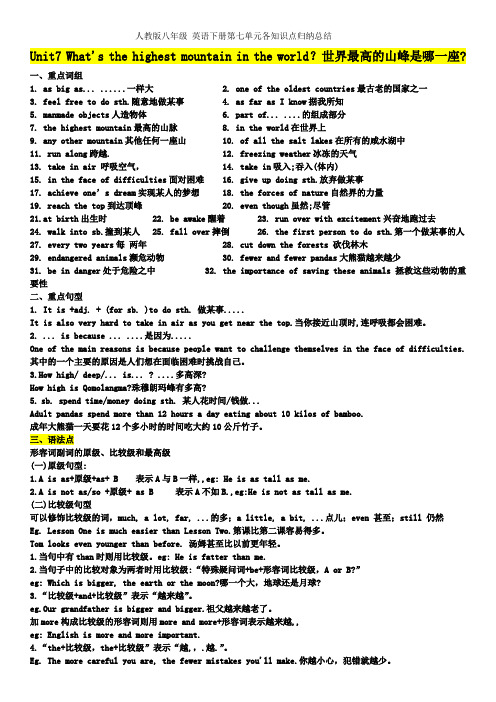
人教版八年级英语下册第七单元各知识点归纳总结Unit7 What's the highest mountain in the world?世界最高的山峰是哪一座?一、重点词组1. as big as... ......一样大2. one of the oldest countries最古老的国家之一3. feel free to do sth.随意地做某事4. as far as I know据我所知5. manmade objects人造物体6. part of... ....的组成部分7. the highest mountain最高的山脉 8. in the world在世界上9. any other mountain其他任何一座山10. of all the salt lakes在所有的咸水湖中11. run along跨越. 12. freezing weather冰冻的天气13. take in air 呼吸空气,14. take in吸入;吞入(体内)15. in the face of difficulties面对困难 16. give up doing sth.放弃做某事17. achieve one’s dream实现某人的梦想18. the forces of nature自然界的力量19. reach the top到达顶峰20. even though虽然;尽管21.at birth出生时22. be awake醒着23. run over with excitement兴奋地跑过去24. walk into sb.撞到某人25. fall over摔倒26. the first person to do sth.第一个做某事的人27. every two years每两年28. cut down the forests 砍伐林木29. endangered animals濒危动物30. fewer and fewer pandas大熊猫越来越少31. be in danger处于危险之中32. the importance of saving these animals拯救这些动物的重要性二、重点句型1. It is +adj. + (for sb. )to do sth. 做某事.....It is also very hard to take in air as you get near the top.当你接近山顶时,连呼吸都会困难。
人教版八下册英语unit7短语句型作文知识点复习总结

Unit 7 What’s the highest mountain?语法知识点形容词比较级的句型结构①“形容词的比较级+than+比较对象”。
前后相比较的两个事物一定要属于同类,而且做比较时,一定要避免自身与自身相比。
表示一个范围内两事物的比较用“比较级+than+any other+单数名词”。
He is taller than any other student in his class.他比班上任何一个学生的个子都高。
②“as+形容词原形+as+比较对象”,意为“与…一样”。
其否定形式为“not so/as...as...”,意为“不及;不与…一样…”。
This film is(not) as interesting as that one.这部电影(不)和那部电影一样有趣。
③“the+比较级…,the+比较级…”表示“越…,越……”。
The more you read,the more you know.你书读得越多,你知道得就越多。
④“比较级+and+比较级”表示“越来越……”。
Our city is more and more beautiful.我们的城市越来越漂亮了。
⑤选择疑问句中,常用句型:Which/When/Who+be+形容词比较级,A or B?Which is healthier,water or drinks?水和饮料哪一个更健康?【注意】修饰比较级可用much,a little, even, still, a lot等。
当比较级后有of the two...之类的短语时,比较级前要加定冠词the。
(特殊用法)中国是世界上最古老的国家之一。
1.China is larger than any other country in Asia.③“the+序数词(除了first)+形容词最高级+可数名中国比其他任何亚洲国家都要大。
比较级 +than any other+名词单数+范围(包括主语)2.Beijing is larger than any city in Africa.比较级 + than +any+ 名词单数+范围(不包括主语)形容词最高级的句型结构①“主语+be+the+形容词最高级+in/of+范围”表示“在某范围内最……”。
人教版八年级下册Unit7-10重点短语、句型
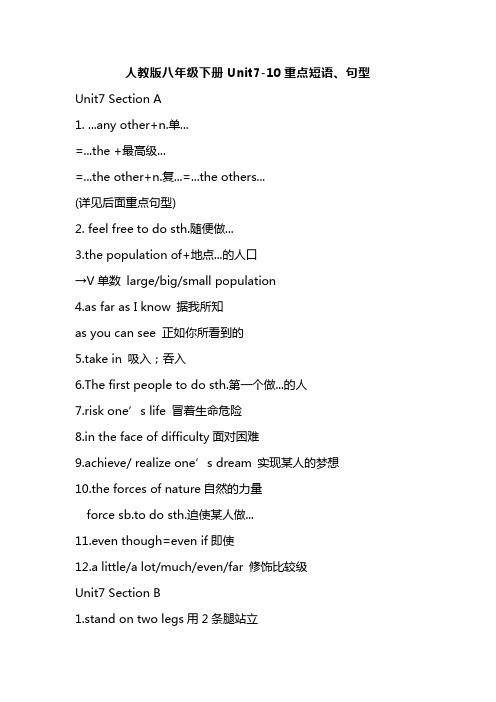
人教版八年级下册Unit7-10重点短语、句型Unit7 Section A1. ...any other+n.单...=...the +最高级...=...the other+n.复...=...the others...(详见后面重点句型)2. feel free to do sth.随便做...3.the population of+地点...的人口→V单数large/big/small population4.as far as I know 据我所知as you can see 正如你所看到的5.take in 吸入;吞入6.The first people to do sth.第一个做...的人7.risk one’s life 冒着生命危险8.in the face of difficulty面对困难9.achieve/ realize one’s dream 实现某人的梦想10.the forces of nature自然的力量force sb.to do sth.迫使某人做...11.even though=even if即使12.a little/a lot/much/even/far 修饰比较级Unit7 Section B1.stand on two legs用2条腿站立2.at birth 出生时3.up to 到达;至多有4.prepare...for... 为…准备…5.run over to... 跑向…6.walk into 走路时撞着7.fall over 绊倒8.a symbol of... …的象征9.or so 大约10.die from... = die of... 死于…11.catch...for... 为了...而捕捉...12.every two years每2年13.for a short time很短时间14.protect...from...保护...不受...伤害15.teach sb. about sth. 教某人关于…重点句型:1.形容词/副词的比较级、最高级复习。
人教版八年级下册英语第七单元重点归纳
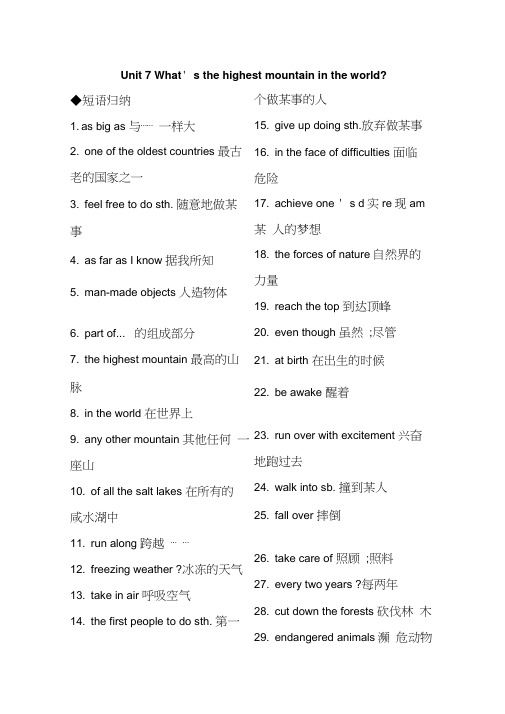
Unit 7 What' s the highest mountain in the world?◆短语归纳1. as big as 与⋯⋯一样大2. one of the oldest countries 最古老的国家之一3. feel free to do sth. 随意地做某事4. as far as I know 据我所知5. man-made objects 人造物体6. part of... 的组成部分7. the highest mountain 最高的山脉8. in the world 在世界上9. any other mountain 其他任何一座山10. of all the salt lakes 在所有的咸水湖中11. run along 跨越⋯⋯12. freezing weather ?冰冻的天气13. take in air 呼吸空气14. the first people to do sth. 第一个做某事的人15. give up doing sth.放弃做某事16. in the face of difficulties 面临危险17. achieve one ' s d实re现am 某人的梦想18. the forces of nature自然界的力量19. reach the top 到达顶峰20. even though 虽然;尽管21. at birth 在出生的时候22. be awake 醒着23. run over with excitement 兴奋地跑过去24. walk into sb. 撞到某人25. fall over 摔倒26. take care of 照顾;照料27. every two years ?每两年28. cut down the forests 砍伐林木29. endangered animals濒危动物30. be in danger 处于危险之中31. the importance of saving these animals拯救这些动物的重要性◆用法集萃1. The elephant weights many times more than this panda. 这头大象的重量是这只熊猫的很多倍。
八年级人教版英语下册unit7 知识点

八年级人教版英语下册unit7 知识点Unit 7是人教版八年级英语下册的一节课,主要介绍了有关音乐和乐器的常用英语表达以及乐器种类等。
本文将针对该单元的重点知识进行详细说明,以便学生更好地掌握相关知识。
一、重点词汇1. 乐器(musical instrument)2. 吉他(guitar)3. 钢琴(piano)4. 小提琴(violin)5. 鼓(drum)6. 口琴(harmonica)7. 红鼓(tom-tom)8. 萨克斯管(saxophone)9. 爵士鼓(Jazz drum)10. 喇叭(trumpet)11. 低音吉他(bass guitar)12. 合奏(ensemble)13. 独奏(solo)14. 演奏(perform)15. 乐曲(musical composition)二、重点语法1. 过去式的构成过去式是英语语言中常见的时态之一,其构成规则通常是在动词原形基础上加“-ed”,不过对于某些不规则动词,过去式的构成则需要记忆其形式。
例如:play - playeddance - dancedtell - told2. 一般现在时和现在进行时的区别一般现在时和现在进行时都是英语语言中常见的时态之一,二者在用法上有所区别。
一般现在时通常用于表示经常性或者普遍的事情。
例如:I play basketball every day. 我每天打篮球。
现在进行时则用于强调正在进行的动作。
例如:She is playing the piano now. 她正在弹钢琴。
三、重点句型1. What do you think of … ?这个句型常用于询问别人对某个事物的看法。
例如:What do you think of this song? 你觉得这首歌怎么样?2. How long have you been … ?这个句型常用于询问别人从事某项活动的时间长度。
例如:How long have you been playing the guitar? 你弹吉他多久了?3. What’s your favorite … ?这个句型常用于询问别人最喜欢的事物。
人教版丨八年级下册英语7单元知识点总结

人教版丨八年级下册英语7单元知识点总结Unit7 XXX?【重点单词:】XXX [skweə(r)] n.平方,正方形,广场meter [ˈmi:tə] n.米deep [di:p] adj.深的desert [ˈdezət] n.沙漠population [ˌpɔpjuˈleiʃən] n.人口(数量),全体居民Asia [ˈeɪʒə] n.亚洲XXX (可以)随便(做某事)tour [tuə] n.旅行,观光wall [wɔ:l] n.墙amazing [əˈmeɪzɪŋ] adj.令人惊异的ancient [ˈeɪnʃənt] adj.古代的,古老的protect [prəˈtekt] v.保护wide [waɪd] adj.宽的,广漠的as far as I know就我所知achieve [əˈtʃi:v] v.完成,完成achievement [əˈtʃi:vmənt] n.成就,成绩XXX [saʊθ'westən] adj.西南的,西北偏向的thick [θɪk] adj.厚的,浓的include [ɪnˈklu:d] v.包括,包含freezi ng [ˈ] adj.极冷的,冷冻的condition [kənˈdɪʃn] n.条件,状况XXX吸入,吞入succeed [səkˈsi:d] v.胜利,完成方针,完成challenge [ˈtʃælɪndʒɪŋ] n. & v.挑战,考验in the face of面临(题目,艰巨)force [fɔ:s] n.力,力量nature ['neɪtʃə(r)] n.天然界,大天然even though(=even if)纵然,固然ocean ['əʊʃn] n.海洋the XXX Ocean宁靖洋cm(centimeter) [ˈsentɪˌmi:tə] n.厘米weigh [wei] v.称…重量XXX [bɜ:θ] n.出身,产生XXX出身时up to抵达(某数目,水平),未几于adult [əˈdʌlt] n.成年人bamboo [bæmˈbu:] n.竹子endangered [ɪnˈdeɪndʒəd] adj.有风险的,靠近灭尽的,濒危的research [rɪˈsɜ:tʃ] n. & v.研究,调查XXX [ˈ] n.豢养员,保管人awake [əˈweɪk] adj.醒着excitement [ɪkˈsaɪtmənt] n.激动,兴奋walk into走路时撞到fall over绊倒illness [ˈɪlnəs] n.疾病,抱病remaining [rɪˈmeɪnɪŋ] adj.遗留的,残剩的or so大约artwork [ˈɑ:twə:k] n.艺术品,插图,图片wild [waɪld] adj.野性的,野生的government [ˈgʌvənmənt] n.政府whale [weɪl] n.鲸protection [prəˈtekʃn] n.保护,保卫XXX [] adj.宏大的,极多的dynasty [ˈdɪnəstɪ] n.朝代,王朝base [beɪs] n.根蒂根基,基地【重点词组】1. the population of China中国的人口2. one of the oldest countries最古老的国家之一3. XXX.随意地做某事4. as far as I know据我所知as you can see,..正如你所瞥见的,…5. man-made objects人造物体7. XXX登山运动8,live up to活到……9.XXX比其他任何一座山高10. of all the salt XXX在所有的咸水湖中11. run along绵延,横亘……12. another 200 or so另有约莫200摆布13,one of the world’s most dangerous sports最危险的运动之一14,one of the most popular places最受欢迎的地方之一15,of all the mountains所有的山之中16,XXX冰冻的天气条件17,risk their XXX冒着他们的生命危险18, XXX挑衅自我challenge ourselves19, in the face of difficulties面临艰巨20, take in air呼吸空气21. the first people to do sth.第一个做某事的人the first people to XXX22. give up doing sth.放弃做某事23. achieve one’s dream实现某人的梦想= make one’s dream cometrue24. the forces of nature自然界的力量25. reach the top到达顶峰26. even though虽然;尽管27. XXX在出身的时分28. XXX醒着29. run over with XXX兴奋地跑过去30. walk into sb.撞到某人die from……死于……31. fall over被…绊倒fall over the chair被椅子绊倒、32. take care of照顾;照料33. every two years每两年34. cut down the forests砍伐林木35. endangered animals濒危动物36. XXX大熊猫越来越少XXX处于风险当中38. the importance of saving these animals拯救这些动物的重要性39,wild animals野生动物sea life海洋生物40 ,XXX保护鲸的划定(on关于)41.water pollution水污染,42only live for a short time because of illnesses由于疾病仅活很短的时间43,make XXX为大熊猫建造更多的家园43. stand on two legs两腿站立44,catch whales for meat, fat and oil为肉,脂肪和油而捕鲸45,stop putting rubbish into the sea停止往大海里丢垃圾46,jump high out of the water高高地跃出水面47,XXX…保护…免于…的伤害XXX.保护孩子免于感冒48,XXX竹林49,XXX熊猫饲养员50,in the remaining forests在剩下的丛林里51,XXX (Qomolangma)世界上最高的山52,the biggest desert in the world (the Sahara)世界上最大的沙漠53,the longest river in the world (the Nile)世界上最长的河54,the deepest of all the salt lakes (the Caspian Sea)所有咸水湖中最深的湖【重点句型】1. It is -\~adj. + (fo r sb. ) to do sth.It is also very hard to take in air as you get near the top.当你接近山顶时,连呼吸都会困难。
八年级英语下册第7单元知识点和作文

八年级英语下册第7单元知识点和作文As we delve into the seventh unit of the Grade 8 English textbook, we embark on a journey that explores the fascinating world of would-be inventions and theirpotential to revolutionize our lives. This unit, titled "Would you mind keeping your voice down?", opens up a discussion on the importance of polite requests and apologies in everyday communication. It encourages students to consider how they can use language effectively to express their needs and desires while respecting the feelings of others.The knowledge points in this unit cover a range of grammatical concepts, including the use of modal verbs to express requests and apologies, as well as practice in writing polite requests and apologies in different scenarios. Students are introduced to the structure of polite requests, such as "Could you please...?" and "Would you mind...?", and are challenged to apply this structureto real-life situations, practicing their ability to communicate effectively and diplomatically.The writing component of this unit focuses on imaginative writing, asking students to create their own would-be inventions and describe them in detail. This exercise not only tests their understanding of the grammar and vocabulary learned in the unit, but also theircreativity and ability to present ideas clearly and concisely. Students are encouraged to think outside the box, envisioning inventions that could potentially solve real-world problems and improve people's lives.In the realm of vocabulary, the unit introduces new terms related to inventions and technology, such as "inventor," "invention," "robot," and "machine." Students are expected to not only recognize and understand these words but also use them effectively in their writing. This expanded vocabulary helps them to express more complexideas and concepts, enhancing their overall language proficiency.The combination of grammar, vocabulary, and imaginative writing in this unit provides students with a comprehensivelearning experience that is both challenging and engaging. By practicing polite requests and apologies, they learn to communicate more effectively with others, while the exercise in imaginative writing stimulates their creativity and critical thinking skills.In conclusion, the seventh unit of the Grade 8 English textbook is a rich and diverse learning resource that covers a wide range of language skills and concepts. It challenges students to push their boundaries, think critically, and communicate effectively, while also nurturing their imaginations and creativity. Through this unit, students gain valuable insights into the power of language and its role in shaping our interactions with the world.**解锁八年级英语下册第七单元的秘密**当我们深入八年级英语下册的第七单元时,我们踏上了一段探索未来发明及其有可能改变我们生活的潜力的奇妙旅程。
Unit7必背基础知识短语句型语法及作文汇总人教版八年级英语下册

八年级英语下期Unit 7必背基础知识短语句型语法及作文汇总Unit 7 What's the highest mountain in the world?A)重点单词Sectiom A1. wall n.墙2. Asis n. 亚州3.desert n.沙漠4. force m.力:力量5.ocean n.大海:海洋6. thick adj.厚的;浓的v.包括:包含9. tour n.&n.旅行:旅游10.square n.平方:正方形11, deep adj. 深的;纵深的12,wide adj.宽的:宽闼的13.condition n.条件:状况14.nature.自然界;大自然15.tourist n..旅行者;观光者16. achievement n.成就:成绩17,meter(=metre)=. 米;公尺18.succeed s.实现目标:成功19 ancient adj.古代的:古老的20. achieve .达到:完成;成功21.population =人口:人口数量Section B1, bamboo n.竹子 2. awake adj. 醒省3. wild adj.野生的4. illness.n.疾病;病5. birth m.出生促生6.oil n. 油:食用油:石油n n.激动;兴奋n.词养员:保管人ernment n.政府;内图n.&v.研究;调查12. huge adj.巨大的:极多的13, weigh重量是……,称……的重量14. adult adj.成年的:成人的=.成人:成年动物B 词形转换Section A1.tour-trip(近义词)2.ocean-sea(近义词)3, thick-thin(反义词) an(名词)-Asian(形容词)5.deep(形容词)-deeply(副词)6.wide(影容词)-widely(副词)7.nature(名词) natural (形容词)8.achieve(动词)-achievement(名词)Section B1.huge----big(近义词) --asleep(反文词)--study(近义词) 4.ill(形容同)-illness(名词)5.keep(动词)-keeper(名词)6.weigh(动词)weight(名词)7.excite(动词)--excitement(名词) 5protect(动问)-protection(名词)C 重点短语Section A1.take in fresh air吸收新鲜空气2.run along 跨越……-3.on today’s Great Wall Tour有关今天的长城之旅4. reach the top 列达顶峰5.as big as 与……tain climbing 登山7.as far as I know 就我所知8:man-made objects 大造物体9. freezing weather 冰东的天气10.even though/even 即使:虽然11.feel free(可以)随便(做某事)12. the forces of nature 大自然的力量13.in the face of difficulties 面临危险14. any other mountain其他任何一座山15. achieve ones dream实现某人的梦想16.of all the salt lakes 在所有的成水制中17.20 square kilometers 20平方公里18.10 meters in height10 meters deep⎧⎨⎩10米深19. the forces of nature 自然界的力量20.the population of China 中国的人口21.feel free to do sth随便做某事22.be amazed at ... ......be surprised at.........⎧⎪⎨⎪⎩对感到惊愕对感动惊讶23.be amazed to do sthbe surprised to do sth⎧⎪⎨⎪⎩做某事感到惊愕做某事感到吃惊24.in nature在自然界中25.to one's surpriseto one's amazementto one's excitement⎧⎪⎪⎨⎪⎪⎩使人惊讶的是令人惊讶的是令某人兴奋的是26. protect sb/sth fro m…保护某人/物不受……危害27.as far as I knowas far as I seeas far as I remember⎧⎪⎪⎨⎪⎪⎩就我所知就我所见就我所记得28.including meme induded⎫⎪⎬⎪⎭包括我在内29.be in good conditionbe in bad condition⎧⎨⎩状态良好状态糟30.succeed inbe successful in⎫⎬⎭在……方面成功31. in the face of many problemsface many problems⎫⎬⎭面对很多问题32. in the face of many difficultiesface of many difficulties⎫⎬⎭面对很多困难33. achieve one's dreamrealize one's dream ⎫⎬⎭实现梦想34. pudh sb to do sthfarce sb to do sth⎫⎬⎭强迫某人做某事35. even thougheven if⎫⎬⎭即使,虽然,尽管Section B1.man-made objects人造物体2.fall over 绊倒3. live up to 活到4. at birth=When sb was born出生时5. be born in/on … 出生于……6. die from 因……而死7.cut down 砍伐:砍倒into走路时撞着9.every two years 每两年10.do research做研究11. endangered wild animals 濒危野生动物12.run over to sb.跑向某人13.the Pacific Ocean 太平洋the Atlantic Ocean 大西洋The Indian Ocean印度洋The Arctic Ocean北冰洋up to 20 30 years 达到20至30年14. in excitementwith excitement ⎫⎬⎭兴奋地15. {walk into sb/sth 走路时撞着某人或某物16.fall asleepfall in love with... ............ fall downfall behindfall overfall ill⎧⎪⎪⎪⎪⎪⎪⎨⎪⎪⎪⎪⎪⎪⎩睡着,入睡,进入梦香爱上喜欢上跌倒,突然倒塌落后、向前绊倒、倾倒生病,病倒17.200or so pandasabout/around200pandas⎫⎬⎭大约200只熊猫18.any other mountain in the world世界上任何其它的一座山19.the other boys in your class你们班其余的男孩20.of all the salt lakes在所有的咸水湖中21.one of the oldest countries in the world世界上最古老的国家之22.as you can see正如你所看到的23.risk one’s lives冒生命危险24.the spirit of … …的精神25.at the Chengdu Research Base在成都研究基地26.prepare for… 为……做准备27.every two years每两年28.die from/of … 因……而死29.10 kilos of bamboo十公斤竹子30.spend time/money doing sth花费时间或钱做某事31.spend time/money on sth在某事上花费时间或钱32.carry out/make/do research 做调查/研究3……关于...做调查/研究34.learn more about...更多了解D).重点句子1.What’s the highest mountain in the world?世界上最高山脉是什么?molangma is higher than any other mountain in the world. 珠穆朗玛比世界上任何其它一座山都高3.How high is Qomolangma?珠穆玛峰有多高?4.The Caspian Sea is the deepest of all the salt lakes.在所有盐水湖中,里海最深5.The Ming Great Wall is 8,850 kilometers long.明长城公里长。
八年级下册人教版英语unit7知识点
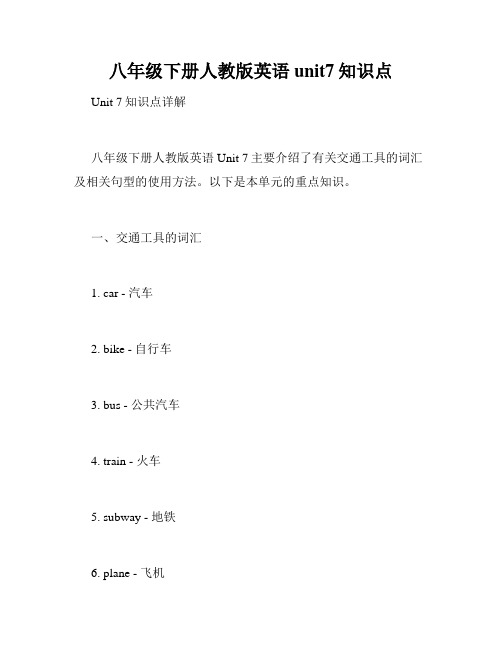
八年级下册人教版英语unit7知识点Unit 7知识点详解八年级下册人教版英语Unit 7主要介绍了有关交通工具的词汇及相关句型的使用方法。
以下是本单元的重点知识。
一、交通工具的词汇1. car - 汽车2. bike - 自行车3. bus - 公共汽车4. train - 火车5. subway - 地铁6. plane - 飞机7. ship - 船8. taxi - 出租车9. helicopter - 直升机10. boat - 小船二、交通工具的形容词1. fast - 快速的2. slow - 慢的3. comfortable - 舒适的4. crowded - 拥挤的5. noisy - 吵闹的6. convenient - 方便的7. dangerous - 危险的三、询问交通信息的常用句型1. How do you usually go to school/work? - 你通常怎么去学校/上班?2. How long does it take you to get to school/work? - 你到学校/上班需要多长时间?3. Which do you prefer, a bike or a car? - 你更喜欢自行车还是汽车?4. Have you ever taken a train/plane/ship? - 你坐过火车/飞机/船吗?5. Is it far from here to the airport/station? - 从这里到机场/车站远吗?四、交通安全的表达方式1. Wear your seat belt. - 系好你的安全带。
2. Don't drink and drive. - 不要酒后驾车。
3. Obey traffic rules. - 遵守交通规则。
4. Look both ways before crossing the street. - 过马路之前向两边看。
人教版八年级下册英语第七单元重点归纳
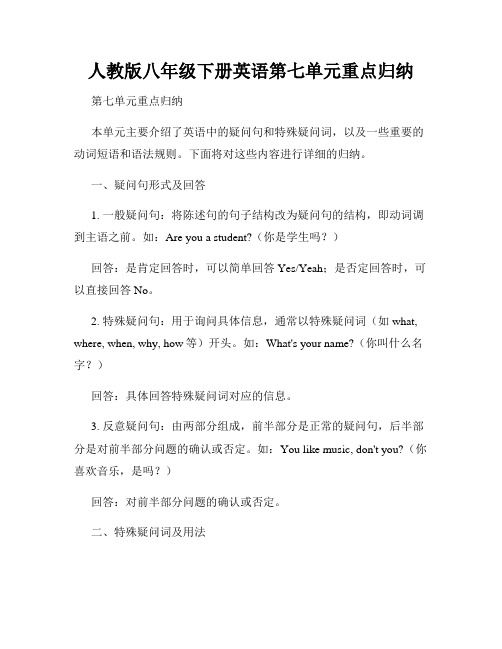
人教版八年级下册英语第七单元重点归纳第七单元重点归纳本单元主要介绍了英语中的疑问句和特殊疑问词,以及一些重要的动词短语和语法规则。
下面将对这些内容进行详细的归纳。
一、疑问句形式及回答1. 一般疑问句:将陈述句的句子结构改为疑问句的结构,即动词调到主语之前。
如:Are you a student?(你是学生吗?)回答:是肯定回答时,可以简单回答Yes/Yeah;是否定回答时,可以直接回答No。
2. 特殊疑问句:用于询问具体信息,通常以特殊疑问词(如what, where, when, why, how等)开头。
如:What's your name?(你叫什么名字?)回答:具体回答特殊疑问词对应的信息。
3. 反意疑问句:由两部分组成,前半部分是正常的疑问句,后半部分是对前半部分问题的确认或否定。
如:You like music, don't you?(你喜欢音乐,是吗?)回答:对前半部分问题的确认或否定。
二、特殊疑问词及用法1. What:用于询问事物、物品或职业。
如:What's this?(这是什么?)2. Where:用于询问地点或位置。
如:Where is the library?(图书馆在哪里?)3. When:用于询问时间。
如:When is your birthday?(你的生日是什么时候?)4. Why:用于询问原因或理由。
如:Why are you late?(你为什么迟到?)5. How:用于询问方式、方法或程度。
如:How do you go to school?(你怎么去学校?)6. How much/many:用于询问数量或价格。
如:How much is this T-shirt?(这件T恤多少钱?)三、重要动词短语1. get up:起床。
如:I get up at 7 a.m every morning.(我每天早上七点起床。
)2. have breakfast/lunch/dinner:吃早餐/午餐/晚餐。
2022人教版初中英语八年级下册Unit7重点知识点归纳总结(复习必背).docx

2022年人教版八年级英语单元重点知识点归纳八年级下册Unit7 whafs the highest mountain in the world?一、四会单词(详见P121)square,meter,deep,desert,population,Asia,tour,tourist,wall,ancient,protect,wide ,achievement,thick,include,condition,succeed,achieve,force,nature,ocean,wcigh,birth,adult,bamboo,resear ch,kecpcr, awake,excitement,illness,remaining,wiki,government,oil.piotection,huge二、重点词组与句子Section A1.the highest mountain in the world (Qomolangma)世界上最高的山the biggest country in Asia 亚洲最大的国家2.the biggest desert in the world (the Sahara)世界上最大的沙漠the longest river in the world (the Nile)世界上最长的河3.as big as 与...一样大feel free to do sth.(可以)随便做…4.as you can see,..正如你所看见的as far as I know 据我所知5.oneoflhe+形容词的最高级+可数名词复数最…之一(谓单)take in 呼吸11 .the first people to reach the top第-批到达顶上的人I2.risk their lives冒着他们的生命危险I3.one of the main reasons is...主要原因之一是14.in the face of difficulties 面对困难15.give叩doing sth 放弃做某事achieve our dreams=realize our dreams=make our dreams come true 实现梦想16.even though=even if 虽然;尽管We all know chat China is one of the oldest countries in the world.我们都知道中国是世界上最古老的国家之一。
人教版英语八年级下册第七单元单词、短语、知识点
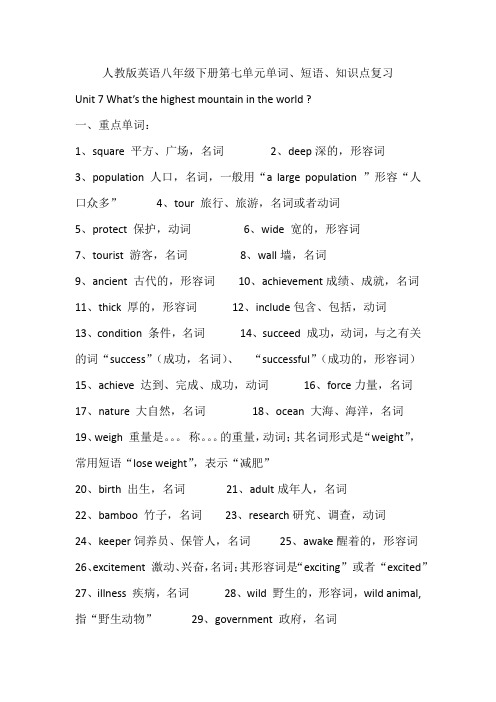
人教版英语八年级下册第七单元单词、短语、知识点复习Unit 7 What’s the highest mountain in the world ?一、重点单词:1、square 平方、广场,名词2、deep深的,形容词3、population 人口,名词,一般用“a large population ”形容“人口众多”4、tour 旅行、旅游,名词或者动词5、protect 保护,动词6、wide 宽的,形容词7、tourist 游客,名词8、wall墙,名词9、ancient 古代的,形容词10、achievement成绩、成就,名词11、thick 厚的,形容词12、include包含、包括,动词13、condition 条件,名词14、succeed 成功,动词,与之有关的词“success”(成功,名词)、“successful”(成功的,形容词)15、achieve 达到、完成、成功,动词16、force力量,名词17、nature 大自然,名词18、ocean 大海、海洋,名词19、weigh 重量是。
称。
的重量,动词;其名词形式是“weight”,常用短语“lose weight”,表示“减肥”20、birth 出生,名词21、adult成年人,名词22、bamboo 竹子,名词23、research研究、调查,动词24、keeper饲养员、保管人,名词25、awake醒着的,形容词26、excitement 激动、兴奋,名词;其形容词是“exciting”或者“excited”27、illness 疾病,名词28、wild 野生的,形容词,wild animal,指“野生动物”29、government 政府,名词30、oil 油,名词31、protection 保护,名词;其动词为protect 32、huge 巨大的,形容词短语:1、square kilometers 平方千米2、the biggest population 人口最多3、a lot \much bigger 大得多4、feel free to do sth. 随便做某事5、main reason 主要原因6、as you can see 正如你所看到的例句:As you can see, I’m taller than my sister.正如你所看到的,我比我妹妹高。
八年级英语下册第7单元知识点和作文
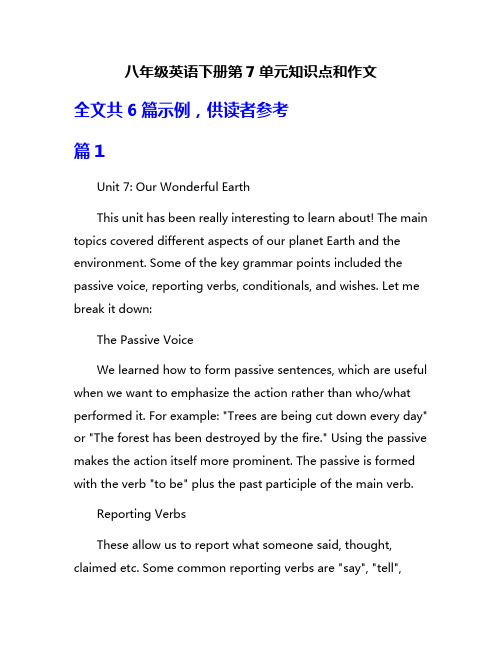
八年级英语下册第7单元知识点和作文全文共6篇示例,供读者参考篇1Unit 7: Our Wonderful EarthThis unit has been really interesting to learn about! The main topics covered different aspects of our planet Earth and the environment. Some of the key grammar points included the passive voice, reporting verbs, conditionals, and wishes. Let me break it down:The Passive VoiceWe learned how to form passive sentences, which are useful when we want to emphasize the action rather than who/what performed it. For example: "Trees are being cut down every day" or "The forest has been destroyed by the fire." Using the passive makes the action itself more prominent. The passive is formed with the verb "to be" plus the past participle of the main verb.Reporting VerbsThese allow us to report what someone said, thought, claimed etc. Some common reporting verbs are "say", "tell","think", "believe", "claim" and more. For example: "He said that he would recycle more" or "They claimed that global warming is a serious issue." Reporting verbs are followed by a "that" clause.ConditionalsThese are for discussing hypothetical situations and their consequences. There are different types:Zero conditional for general truths (If you recycle, you help the environment)First conditional for possible future situations (If we don't act now, the damage will be irreversible)Second conditional for hypothetical present situations (If I had a garden, I would grow my own vegetables)Third conditional for hypothetical past situations (If people had been more aware, we wouldn't be in this mess)WishesWe can use "wish" to express desires about present situations that are unlikely to happen or past situations that didn't occur:"I wish I could do more for the environment.""I wish people had taken climate change more seriously years ago."Aside from the grammar, we also learned lots of environment-related vocabulary like "carbon footprint", "sustainable", "renewable energy", "pollution" and much more.For the writing section, we had to write a for-and-against essay about the topic: "Schools should ban cheap stationery made from non-recyclable materials to protect the environment."Here's how I approached the essay:IntroductionStated the issue in a clear topic sentenceOutlined the two sides (for banning vs against banning)Gave my thesis - my personal opinion on the matterBody Paragraph 1: Arguments For BanningUsing cheap non-recyclable materials is extremely wasteful and harms the environmentIt goes against the principles of sustainability that schools should promoteSchools can set a good example by using eco-friendly alternativesBody Paragraph 2: Arguments Against BanningCheap stationery is affordable for students from underprivileged backgroundsRecyclable materials tend to be more expensiveThere are ways to dispose of non-recyclable items responsiblyBody Paragraph 3: My OpinionI believe schools should ban non-recyclable stationery as protecting the environment is crucialHowever, they need to provide affordable eco-friendly optionsSchools should educate students on environmental awarenessConclusionReiterated my thesis stanceEmphasized the importance of environmentalism for future generationsEncouraged the reader to consider their own environmental impactOverall, I felt this unit was incredibly relevant as environmental issues are a major global challenge. The grammar and writing tasks really helped strengthen my ability to discuss and present arguments about sustainability in English. Even though it was quite dense content, I'm glad I had the opportunity to expand my knowledge about our wonderful planet Earth!篇2Unit 7 - A Changing WorldWow, Unit 7 has been a wild ride! We've covered so many topics related to the changing world around us. From technological advancements to environmental issues, it's been an eye-opening experience. Let me break it down for you.First up, we delved into the fascinating world of technology and how it's rapidly transforming our lives. We learned about cutting-edge innovations like artificial intelligence, virtual reality, and renewable energy sources. It's mind-blowing to think about how far we've come in such a short time. Who would have thought that we'd have robots assisting us in daily tasks or thatwe could explore distant galaxies from the comfort of our homes?Speaking of exploration, we also discussed the impact of technology on space exploration. The recent Mars rover missions and the successful launch of the James Webb Space Telescope have given us unprecedented insights into the cosmos. It's incredible to think that we're unlocking the secrets of the universe, one discovery at a time.But with great advancements come great challenges. We couldn't overlook the environmental issues that our changing world is facing. Climate change, deforestation, and pollution are serious threats that demand our attention. It was eye-opening to learn about the devastating effects of human activities on our planet and the urgent need for sustainable practices.One topic that really struck a chord with me was the concept of eco-friendly living. We discussed simple yet effective ways to reduce our carbon footprint, such as recycling, conserving energy, and adopting a plant-based diet. It's empowering to know that even small changes in our daily habits can have a significant impact on the environment.Another fascinating aspect of this unit was exploring the role of technology in education. Online learning platforms, virtualclassrooms, and interactive educational apps are revolutionizing the way we acquire knowledge. It's incredible to think that we can now access a wealth of information and connect with experts from around the globe with just a few clicks.But with all these advancements, it's important to strike a balance and maintain a sense of human connection. We discussed the importance of face-to-face interactions, outdoor activities, and unplugging from our devices from time to time. It's a reminder that while technology can enhance our lives, it should never replace the value of real-life experiences and human connections.Overall, Unit 7 has been an eye-opening journey into the ever-changing world we live in. It's a reminder that while progress is inevitable, we must remain mindful of its impact and strive to create a sustainable future for generations to come.Now, let's talk about the writing assignment. We were tasked with crafting a persuasive essay on a topic related to the changing world. After careful consideration, I decided to write about the importance of embracing renewable energy sources.In my essay, I plan to highlight the devastating consequences of our reliance on fossil fuels, such as climate change, air pollution, and the depletion of finite resources. I'llthen present a compelling case for the adoption of renewable energy sources like solar, wind, and hydroelectric power.I'll discuss the numerous benefits of renewable energy, including its sustainability, cost-effectiveness in the long run, and the potential for job creation in the green energy sector. I'll also address common counterarguments, such as the initial high cost of implementation and the intermittent nature of some renewable sources.To strengthen my argument, I'll incorporate statistics, expert opinions, and real-life examples of countries and communities that have successfully transitioned to renewable energy sources. I'll emphasize the urgency of taking action now to mitigate the effects of climate change and secure a篇3Unit 7: A Greener WorldHey there! It's me again, your friendly neighborhood8th-grader, here to share my thoughts on Unit 7 of our English textbook. This unit is all about the environment and sustainability, and let me tell you, it's been an eye-opener!First up, we learned about the importance of protecting our planet. The vocabulary section introduced us to words like "conservation," "renewable," and "eco-friendly." I never realized how much damage we humans have caused to the environment through deforestation, pollution, and overconsumption. It's a wake-up call for all of us to start making conscious efforts to reduce our carbon footprint.One of the reading passages talked about the impact of plastic waste on our oceans. Did you know that plastic takes hundreds of years to decompose? And during that time, it breaks down into tiny pieces that end up in the stomachs of marine life. That's just heartbreaking! I'm definitely going to start using reusable bags and bottles from now on.Another passage focused on the importance of recycling. I had no idea that recycling just one aluminum can could save enough energy to power a TV for three hours! That's crazy! And it's not just cans – we can recycle paper, glass, and even electronics. I'm going to start a recycling program at home and encourage my family to get on board.The grammar section covered some pretty tricky concepts, like conditional sentences and passive voice. I'll admit, I struggled a bit with those at first. But our amazing teacher, Ms.Johnson, helped us understand them through some really cool examples. Like, "If we don't take action now, the planet will be in trouble." See what I did there? Conditional sentence game strong!Speaking of Ms. Johnson, she's been an absolute rock star throughout this unit. Not only did she make the lessons engaging and fun, but she also organized a field trip to a local environmental center. We got to see firsthand how they're working to preserve natural habitats and promote sustainable living. It was so inspiring!Now, let's talk about the writing part of this unit. We had to write a persuasive essay on why it's important to go green. I chose to focus on the benefits of using renewable energy sources like solar and wind power. Not only are they better for the environment, but they can also save us money in the long run. Plus, who doesn't love the idea of harnessing the power of the sun and wind? It's like having a personal superhero energy source!Overall, this unit has been a game-changer for me. I've learned so much about the challenges our planet is facing and the steps we can take to make a difference. From now on, I'mgoing to be more mindful of my choices and their impact on the environment.Who knows, maybe one day I'll become an environmental scientist or engineer and help develop innovative solutions to combat climate change. For now, though, I'll start small – by recycling, reducing my energy consumption, and spreading awareness among my friends and family.After all, we only have one Earth, and it's up to us to protect it. So, let's get greener, one step at a time!篇4Unit 7 – Preserving Our EnvironmentHey there! It's me again, your friendly neighborhood student, here to share my thoughts on Unit 7 of our English textbook. This unit has been all about the environment, and let me tell you, it's been quite an eye-opener!First up, we learned about the concept of "going green." Now, I'll be honest, I used to think it was just some fancy catchphrase that tree-huggers used, but boy, was I wrong! Going green is all about making conscious efforts to protect our planet and reduce our environmental impact. From conserving energyand water to reducing waste and pollution, there are so many ways we can contribute to a greener future.One of the key topics we covered was renewable energy sources. I never realized how much potential there is in harnessing power from the sun, wind, and even the Earth's heat! Renewable energy is not only clean and sustainable, but it also helps us cut down on our reliance on fossil fuels, which are major contributors to global warming and climate change.Speaking of climate change, that was another major focus of this unit. Learning about the devastating effects of rising temperatures, melting glaciers, and extreme weather events really hit home for me. It's scary to think that our actions today could have such far-reaching consequences for future generations. But the good news is, we can still make a difference by reducing our carbon footprint and advocating for policies that promote environmental sustainability.Another aspect we explored was biodiversity and the importance of protecting various ecosystems and species. It's mind-blowing to think that there are millions of plants and animals on our planet, each playing a vital role in maintaining the delicate balance of nature. Deforestation, habitat loss, andpollution are just a few of the threats that endanger this biodiversity, and it's up to us to take action to preserve it.Now, let's talk about something a bit more personal – our lifestyle choices. This unit really made me think about how my daily habits impact the environment. From the food I eat (did you know that meat production is a major contributor to greenhouse gas emissions?) to the products I use (hello, single-use plastics!), there are so many areas where I can make more eco-friendly decisions.I chose to write about the need for better waste management practices in our town. You see, we have a serious problem with illegal dumping and improper disposal of trash, which not only makes our neighborhoods look unsightly but also poses health risks and contributes to pollution. In my essay, I outlined the current situation, explained the potential consequences of inaction, and proposed initiatives like improving recycling infrastructure, implementing fines for littering, and organizing community clean-up events.Writing this composition really made me realize how powerful the written word can be when it comes to effecting change. If I can convince even a handful of people to adopt moresustainable habits or support environmental causes, then my efforts will have been worthwhile.Overall, this unit has been a real game-changer for me. I've learned so much about the pressing environmental issues facing our planet and the various ways we can take action to preserve our natural resources and ecosystems. It's not going to be easy, and it will require a collective effort from individuals, communities, and governments alike, but I'm more motivated than ever to do my part.So, here's to a greener future, my friends! Let's continue to educate ourselves, make sustainable choices, and advocate for policies that prioritize environmental protection. Because at the end of the day, we only have one Earth, and it's our responsibility to take care of it.篇5Unit 7 - Cultural TraditionsThis unit has been really interesting to learn about different cultural traditions from around the world. I feel like I've expanded my understanding of how diverse humanity is.The vocabulary section introduced words like "heritage," "ritual," "ancestral," and "ceremonial." Understanding the nuances of this terminology has helped me better describe and discuss cultural practices. For example, a "ritual" refers to a ceremonial act or ritual observance, while "ancestral" means relating to or inherited from ancestors. Building this more precise vocabulary has elevated my ability to communicate about cultural topics.The reading passages covered a range of traditions like Canadian Vikings celebrating their Scandinavian roots, the Zulu Reed Dance in South Africa, and the Xinguan festival in China's Guizhou province. Each gave insight into the history, meaning, and modern practice of these events and customs. The Xinguan festival details were especially fascinating, learning about the intricate silk ball dancing and traditional dress. I admire how cultural heritage can be preserved yet evolve over centuries.The grammar focus was on using relative pronouns like "who," "which," "where," and "whose" to give more details in sentences. This has been helpful for writing clear, descriptive paragraphs about cultural subjects. For example: "The Reed Dance is an annual ceremony in which thousands of unmarried Zulu women present reeds to the monarch, whose thatchedpalace is rethatched with the reeds." Relative pronouns allow for richer explanations within a single sentence.In the listening exercises, we heard interviews with people practicing traditions like baking salt-rising bread and celebrating the Mongolian New Year. Listening for key details about the steps, meanings, and histories behind these practices was excellent preparation for the speaking tasks to follow. Being able to comprehend authentic examples makes it easier to then discuss and describe similar customs.The speaking activities had us working in pairs or groups to explore a cultural tradition of our choice and prepare a short presentation. My partner and I researched Día de los Muertos, the Mexican Day of the Dead celebrations. We summarized the history tracing back to indigenous Aztec rituals, described modern altar decorations like marigolds and sugar skulls, and shared thoughts on how celebrating ancestors connects families and communities. It was a fun chance to apply the unit's skills in an engaging way.For the writing assignment, we had to describe a cultural tradition in a multi-paragraph essay. Here is my sample essay on the tradition of Japanese tea ceremonies:The Tradition of Japanese Tea CeremoniesFor centuries, the Japanese tea ceremony has been an integral part of traditional culture, embodying principles of harmony, respect, purity, and tranquility. This ceremonial ritual of preparing and serving powdered green tea originated among Zen Buddhist monks but was later embraced by the samurai warrior elite and aristocratic classes.The tradition is richly steeped in aesthetics and etiquette. The ceremony is typically performed in a specially designed room with natural elements like tatami mats, alcoves for hanging scrolls, and a small garden courtyard. All the ceremonial tools and utensils are treated with great reverence, from thehand-crafted ceramic bowls and bamboo whisks to the cast iron kettles and finely milled tea powder.Both the host and guests must observe numerous ritualized movements, gestures, and phrases to show respect throughout the four-hour ceremony. Guests ritually purify themselves, remove footwear, focus on the choreographed movements of the host, appreciate the artistry of the utensils, and remain silent while sipping the frothy tea. Every precise step is intended to facilitate an appreciation for the present moment and spiritual harmony.More than just serving tea, the tradition represents ideals of hospitality, humility, discipline, and mindfulness. The formalities create a break from the stresses of daily life and celebrate simple joys like craftsmanship, nature's beauty, and shared company. Though it emerged from a religious context, today's tea ceremonies allow people of any background to experience this profound cultural heritage. The practice endures as a means of cultivating gratitude, social etiquette, and unhurried living in Japan's modern society.In conclusion, this unit enabled me to greatly deepen my knowledge and respectful perspective on cultural traditions from around the globe. I've gained useful vocabulary, grammar skills, reading comprehension, and presentational abilities for exploring this fascinating topic. Looking ahead, I'm excited to continue learning about the world's rich cultural diversity.篇6Unit 7: A Greener WorldThis unit has been all about environmental protection and sustainable living. It's a super important topic because our planet is facing some serious environmental challenges like climate change, pollution, and loss of biodiversity. As students, we needto understand these issues and learn how to live moreeco-friendly lives.The reading passages covered some fascinating topics related to the environment. We learned about the Great Pacific Garbage Patch, which is a massive accumulation of plastic and other debris in the Pacific Ocean. It's basically a floating trash island, and it's a shocking example of how our waste can have disastrous consequences for marine life and ecosystems.We also read about urban greening initiatives, which are efforts to introduce more green spaces and vegetation into cities. Things like rooftop gardens, community gardens, and urban forests can help improve air quality, reduce the urban heat island effect, and provide habitats for wildlife. It's amazing how something as simple as planting more trees and plants can make a city more livable and sustainable.The vocabulary in this unit was all about the environment and conservation. We learned words like "recycle," "renewable," "carbon footprint," and "sustainable." These aren't just fancy terms; they represent concepts and practices that we need to incorporate into our daily lives if we want to protect the planet.One of the most interesting grammatical points we covered was the use of the passive voice to describe processes andphenomena. For example, "Trees are being cut down at an alarming rate" or "Plastic waste is being dumped into the ocean." The passive voice helps to highlight the actions being done, rather than focusing on who is doing them.As for writing, we practiced persuasive essays and letters to argue for environmental causes. For example, we might have written a letter to our local government urging them to invest in renewable energy sources or to implement a more comprehensive recycling program.Persuasive writing is all about using strong arguments, rhetorical techniques, and emotive language to convince the reader of your point of view. We learned how to structure our essays effectively, with a clear thesis statement, supporting evidence, and a compelling conclusion.Overall, this unit has been eye-opening andthought-provoking. It's made me realize how crucial it is for us to take action to protect our planet. Even small changes in our daily habits, like reducing plastic use, conserving energy, and supporting eco-friendly initiatives, can make a difference.As young people, we have a responsibility to be environmental stewards and to advocate for sustainable practices. We're the ones who will inherit this planet, and weneed to ensure that it's a livable, healthy place for future generations.So, let's put what we've learned into practice! Let's recycle diligently, reduce our carbon footprints, and raise our voices in support of a greener, cleaner world. Our planet is counting on us.。
八年级英语下册unit7必背词组及句子
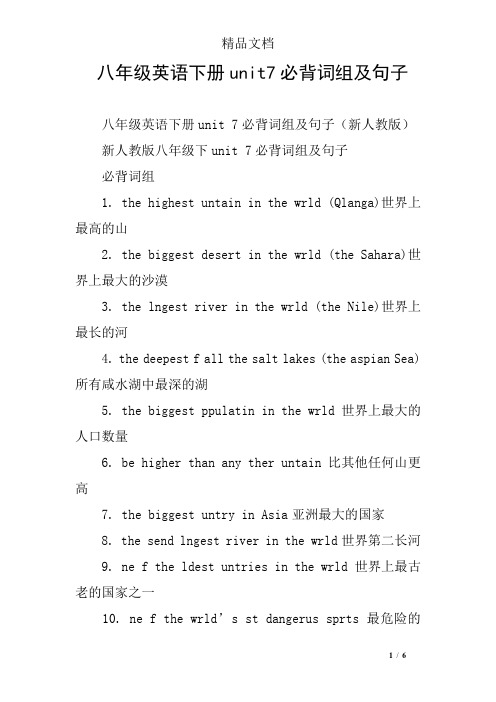
八年级英语下册unit7必背词组及句子八年级英语下册unit 7必背词组及句子(新人教版)新人教版八年级下unit 7必背词组及句子必背词组1. the highest untain in the wrld (Qlanga)世界上最高的山2. the biggest desert in the wrld (the Sahara)世界上最大的沙漠3. the lngest river in the wrld (the Nile)世界上最长的河4. the deepest f all the salt lakes (the aspian Sea)所有咸水湖中最深的湖5. the biggest ppulatin in the wrld世界上最大的人口数量6. be higher than any ther untain比其他任何山更高7. the biggest untry in Asia亚洲最大的国家8. the send lngest river in the wrld世界第二长河9. ne f the ldest untries in the wrld 世界上最古老的国家之一10. ne f the wrld’s st dangerus sprts 最危险的运动之一11. ne f the st ppular plaes最受欢迎的地方之一12. the st faus part最著名的部分13. f all the untains所有的山之中14. a lt/uh bigger大得多15. the ppulatin f the US美国的人口数量16. as big as …和…一样大17. the sae size as…和…一样大18. untain libing爬山19. feel free t ask e…随便问我…20. the anient eperrs古代的皇帝21. as yu an see,..正如你所看见的,…22. as far as I knw,…就我所知,….23. an-ake bets人造物体24. 8848.43 eters high 8848.43米高25. abut 6,300lileters lng大约6,300公里长26. arund 20 iters wide大约20米宽27. freezing weather nditins冰冻的天气条件28. take in air呼吸空气29. the first peple t reah the tp第一个到达顶上的人30. risk their lives冒着他们的生命危险31. hallenge theselves挑战自我32. in the fae f diffiulties面对困难33. the fres f nature自然力34. ahieve ur dreas实现梦想35. at birth在出生的时候36. live up t…活到…37. at the hengdu Researh Base在成都大熊猫研究基地38. panda keepers熊猫饲养员39. die fr illnesses死于疾病40. bab frests竹林41. in the reaining frests在剩下的森林里42. anther 200 r s还有大约200左右43. researh enters研究中心44. endangered anials濒危动物45. iprtane f saving these anials拯救这些动物的重要性46. wild anials野生动物47. nly live fr a shrt tie beause f illnesses由于疾病仅活很短的时间48. ake re hes fr the pandas为大熊猫建造更多的家园49. ath whales fr eat, fat and il为肉,脂肪和油而捕鲸50. sea life海洋生物51. up high ut f the water高高地跃出水面52. rules n whale prtetin保护鲸的制度53. water pllutin水污染54. stp putting rubbish int the sea停止往大海里丢垃圾55. whale parts sld被卖的鲸鱼器官56. have t be prteted不得不被保护57. prtet … fr…保护…免于…的伤害58. weigh any ties re than this panda 比这只熊猫重很多倍59. weigh abut 0.1 t 0.2 kils 重量大约是 0.1到0.2千克必背句子1. This akes it the lngest wall in the wrld.这让它成了世界上最长的墙2. The ain reasn was t prtet their part f the untry.主要原因是为了保卫他们部分的国土.3. As far as I knw, there are n an-ake bets as big as this.就我所知,世界上没有和这个一样大的人造工程.4. The Hialayas run alng the suthwestern part f hina.喜马拉雅横卧在中国的东南部.5. f all the untains, Qlanga reses the highest.所有的山之中,珠穆郞玛耸立得最高.6. Thik luds ver the tp and snw an fall very hard.厚厚的去覆盖着山顶, 雪也可能下得很猛.7. It is als very hard t take in air as yu get near the tp.(as = when)当你接近山顶的时候,呼吸也非常的困难.8. The spirit f these libers shws us that we shuld never give up trying t ahieve ur dreas.登山都的精神向我们表明, 我们应该永不放弃努力实现我们的梦想.9. N ean in the wrld is as big as the Paifi ean.世界上没有海洋和太平洋一样大.10. This elephant weighs any ties re than this panda.这头大象的重量比这头熊猫重许多倍.11. Lin ei and the ther panda keepers are preparing the ilk fr the baby pandas’ breakfast.林伟和其他的熊猫饲养员正在为熊猫准备牛奶早餐.12. The babies are already awake and hungry.熊猫宝宝已经醒了,也很饿.13. hen the babies see the keepers, they run verwith exiteent and se f the even walk int their friends and fall ver!当宝宝们看到饲养员的时候, 他们就兴奋地跑过,有些还因看不清而撞上他们的伙伴,并且摔倒了.14. I take are f the like they’re y wn babies.我照料他们就象他们是我自己的宝宝一样.15. I wash, feed and play with the every day.我每天都洗他们,喂他们并且和他们一起玩.16. Pandas d nt have any babies, aybe nly ne every tw years.熊猫不能生很多宝宝, 也许每两年才一只.17. Adult pandas spend re than 12 hurs a day eating abut 10 kils f bab.成年熊猫每天花大约12小时吃10千克竹子.18. The hinese gvernent is als planting re bab trees s there will be re frests fr pandas t live in.中国政府也正在种植更多的竹子以便于熊猫有更多的竹林可以生活.19. e all hpe that in the future there will be a lt re pandas than nw.我们都希望, 未比现在有更多的熊猫.。
Unit7基础知识人教版八年级英语下册
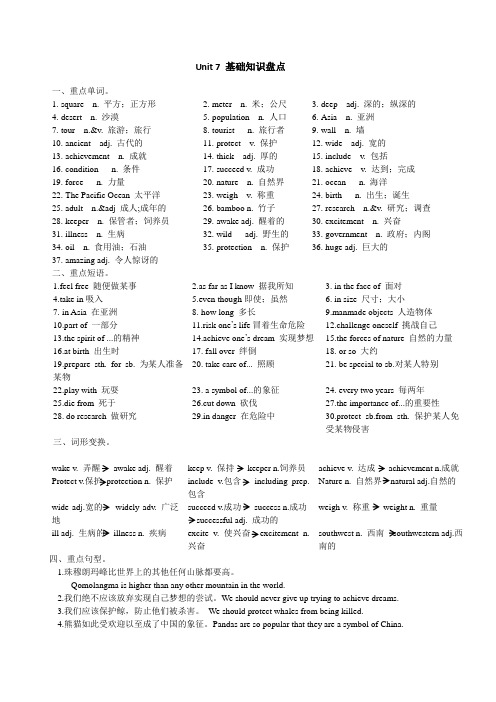
四、重点句型。
1.珠穆朗玛峰比世界上的其他任何山脉都要高。
Qomolangma is higher than any other mountain in the world.2.我们绝不应该放弃实现自己梦想的尝试。
We should never give up trying to achieve dreams.3.我们应该保护鲸,防止他们被杀害。
We should protect whales from being killed.4.熊猫如此受欢迎以至成了中国的象征。
Pandas are so popular that they are a symbol of China.一、重点单词。
1. square n. 平方;正方形2. meter n. 米;公尺3. deep adj. 深的;纵深的4. desert n. 沙漠5. population n. 人口6. Asia n. 亚洲7. tour n.&v. 旅游;旅行 8. tourist n. 旅行者 9. wall n. 墙10. ancient adj. 古代的 11. protect v. 保护 12. wide adj. 宽的13. achievement n. 成就 14. thick adj. 厚的 15. include v. 包括16. condition n. 条件 17. succeed v. 成功 18. achieve v. 达到;完成19. force n. 力量 20. nature n. 自然界 21. ocean n. 海洋22. The Pacific Ocean 太平洋 23. weigh v. 称重 24. birth n. 出生;诞生25. adult n.&adj 成人;成年的 26. bamboo n. 竹子 27. research n.&v. 研究;调查28. keeper n. 保管者;饲养员 29. awake adj. 醒着的 30. excitement n. 兴奋31. illness n. 生病 32. wild adj. 野生的 33. government n. 政府;内阁34. oil n. 食用油;石油 35. protection n. 保护 36. huge adj. 巨大的37. amazing adj. 令人惊讶的 二、重点短语。
Unit7知识要点总结人教版英语八年级下册
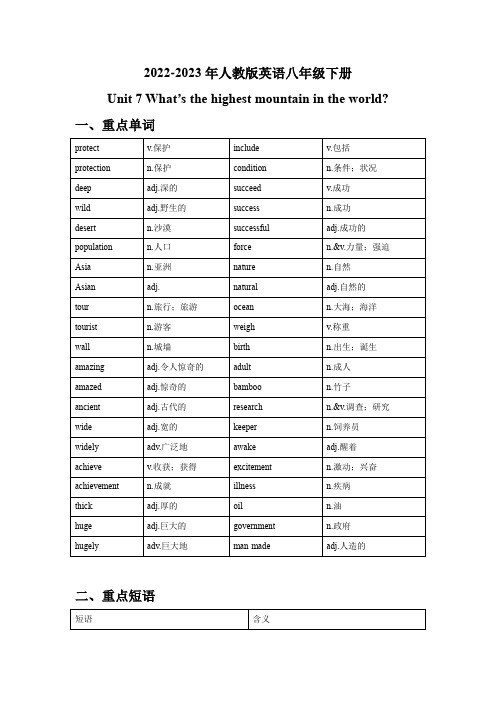
success
n.成功
desert
n.沙漠
successful
adj.成功的
population
n.人口
force
n.&v.力量;强迫
Asia
n.亚洲
nature
n.自然
Asian
adj.
natural
adj.自然的
tourn.旅行;旅游 Nhomakorabeaocean
n.大海;海洋
tourist
n.游客
weigh
注意:几个特殊的形容词和副词的比较级和最高级
原级
比较级
最高级
good ,well
better
best
bad, ill, badly
worse
worst
many ,much
more
most
little
less
least
far
farther, further
farthest, further
old
older, elder
2v.excite使激动;使兴奋
3adj.excited激动的;兴奋的exciting令人激动的
5.tour/ trip/ travel/ journey的辨析
travel一般指长途旅行,到国外或远方旅行,travel还可作动词。
tour旅行,周游,观光,一般团队都是tour。
trip一般指短距离旅行,直达目的地的旅行。
2022-2023年人教版英语八年级下册
Unit7 What’s the highest mountain in the world?
一、重点单词
protect
人教版丨八年级下册英语7单元重点句型解析(附练习题及答案)

人教版丨八年级下册英语7单元重点句型解析(附练习题及答案)重点句型解析1. As far as I know, there are no man-made objects as big as this.as far as I know是一个固定表达方式,还可以说so far as I know,意为“据我所知”。
例如:As far as I know, Wang Tao has two brothers.据我所知,王涛有俩弟弟。
They’re not coming this Sunday, so far as I know.他们这周日不来了——就我所知是这样的。
2. This spirit of these climbers shows us that we should never give up trying to achieve our dreams.give up是动词短语,意为“放弃;停止;戒除”。
give up doing something 意为“放弃做某事;半途而废”。
例如:She doesn’t give up easily. 她不会轻易放弃。
The doctors had given her up but she made a remarkable recovery.医生们已放弃了治愈她的希望,而她却恢复得很好。
You ought to give up smoking; I gave it up last year.你应该戒烟,我去年就戒掉了。
【拓展】give的相关短语:give away赠送,分发;give off放出,释放;give in屈服,让步;give out分发,用完;give back归还3. Scientists say there are now fewer than 2,000 pandas living in the remaining forests.本句中living in the remaining forests为现在分词短语,修饰名词pandas。
- 1、下载文档前请自行甄别文档内容的完整性,平台不提供额外的编辑、内容补充、找答案等附加服务。
- 2、"仅部分预览"的文档,不可在线预览部分如存在完整性等问题,可反馈申请退款(可完整预览的文档不适用该条件!)。
- 3、如文档侵犯您的权益,请联系客服反馈,我们会尽快为您处理(人工客服工作时间:9:00-18:30)。
人教版丨八年级下册英语7单元单词/重点句型及话题写作
单词
square 平方;正方形
meter 米;公尺
deep 深的;纵深的
desert 沙漠
population 人口;人口数量
Asia 亚洲
feel free (可以)随便(做某事)
tour 旅行;旅游
tourist 旅行者;观光者
Wall 墙
amazing 令人大为惊奇的;令人惊喜(或惊叹)的
ancient 古代的;古老的
protect 保护;防护
wide 宽的;宽阔的
as far as l know 就我所知achievement 成就;成绩southwestern 西南的;西南方向的thick 厚的;浓的
include 包括;包含
freezing 极冷的;冰冻的condition 条件;状况
take in 吸入;吞入(体内)succeed 实现目标;成功challenge 挑战;考验
in the face of 面对(问题、困难等)achieve 达到;完成;成功
force 力;力量
nature 自然界;大自然
even though 即使;虽然
ocean 大海;海洋
the Pacific Ocean 太平洋
centimeter 厘米
weigh 重量是……;称……的重量
birth 出生;诞生
at birth 出生时
up to 到达(某数量、程度等);至多有;不多于
adult 成年的;成人的;成人;成年动物
bamboo 竹子
endangered 濒危的
research 研究;调查(用作名词时,重音可放在第一个音节)keeper 饲养员;保管人
awake 醒着
excitement 激动;兴奋
walk into 走路时撞着
fall over 绊倒
illness 疾病;病
remaining 遗留的;剩余的
or so 大约
artwork 图片;插图
wild 野生的
government 政府;内阁whale 鲸
oil 油;食用油;石油protection 保护;保卫
huge 巨大的;极多的Tenzing Norgay 丹增诺尔盖Edmund Hillary 埃德蒙希拉里Junko Tabei 田部井淳子Qomolangma 珠穆朗玛峰
the Nile 尼罗河
the Caspian Sea 里海(世界最大的咸水湖)
the Sahara 撒哈拉沙漠
the Yangtze River 长江
the Yellow River 黄河
the Ming Dynasty 明朝
the Ming Great Wall 明长城
the Himalayas 喜马拉雅山脉
the Amazon River 亚马逊河
Chengdu Research Base 成都研究基地
【重点短语】
1. as big as 与……一样大
2. one of the oldest countries 最古老的国家之一
3. feel free to do sth. 随意地做某事
4. as far as I know 据我所知
5. man-made objects 人造物体
6. part of... ...... 的组成部分
7. the highest mountain 最高的山脉
8. in the world 在世界上
9. any other mountain 其它任何一座山
10. of all the salt lakes 在所有的咸水湖中
11. run along 跨越……
12. freezing weather 冰冻的天气
13. take in air 呼吸空气
14. the first people to do sth. 第一个做某事的人
15. in the face of difficulties 面临危险
16. give up doing sth. 放弃做某事
17. achieve one’s dream 实现某人的梦想
18. the forces of nature 自然界的力量
19. reach the top 到达顶峰
20. even though 虽然;尽管
21. at birth 在出生的时候
22. be awake 醒着
23. run over with excitement 兴奋地跑过去
24. walk into sb. 撞到某人
25. fall over 摔倒
26. take care of 照顾;照料
27. every two years 每两年
28. cut down the forests 砍伐林木
29. endangered animals 濒危动物
30. fewer and fewer pandas 大熊猫越来越少
31. be in danger 处于危险之中
32. the importance of saving these animals 拯救这些动物的重要性【重点句型】
1.It is also very hard to take in air as you get near the top. 当你接近山顶时,连呼吸都会困难。
2.One of the main reasons is because people want to challenge themselves in the face of difficulties. 其中的一个主要的原因是人们想要在面临困难时挑战自己。
3.The spirit of these climbers shows us that we should never give up trying to achieve our dreams. 这些登山者的精神向我们证明:我们永远都不应该放弃实现自己的梦想。
4. How high is Qomolangma? 穆朗玛峰有多高?
5. Although Japan is older than Canada,it is much smaller.虽然日本比加拿大有更悠久的历史,但是日本比加拿大小多了。
6.Adult pandas spend more than 12 hours a day eating about 10 kilos of bamboo. 成年大熊猫一天要花1 2 个多小时的时间吃大约十千克竹子。
【话题写作】
做为一个中国人,你对我们的中国了解多少呢?请给你在美国的笔友Dave 写封信,向他介绍你的祖国。
80 词左右,恰当运用比较级和最高级,可适当发挥。
中国是亚洲最大的国家。
和美国差不多大。
中国有世界上最多的人口。
人们友好勤劳。
长江是世界最长的河流之一。
中国有超过5000 的悠久历史。
比美国的历史长多了。
中国有世界最高山峰。
词汇:as…as, population,the Yangtze River ,the third longest ,much longer, Qomolangma
【优秀满分范文】
Dear Dave,
I’m happy to be your pen pal. I’d like to tell you something about China. China is the biggest country in Asia. It’s almost as big as the USA. China has the biggest population in the world. The people here are friendly and hard-working. The Yangtze River is one of the longest rivers in the world. China is over 5000 years old. It has a much longer history than the US. The Qomolangma is the highest mountain in the world.
I love China very much. Welcome to China and play with me.
Yours,
Li Lei。
